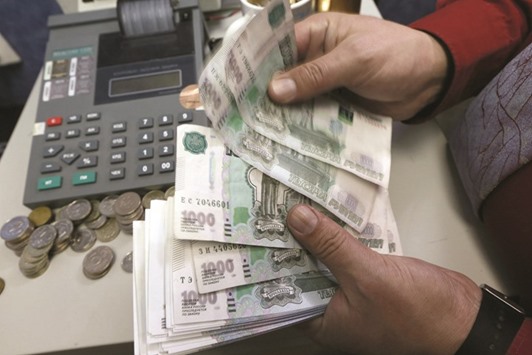Emerging-market stocks and currencies rose for a second week and bonds rallied as oil’s rebound above $40 a barrel and European stimulus boosted demand for riskier assets.
A gauge of developing-nation currencies climbed to a three- month high as China strengthened the yuan’s fixing, spurring a surge in the onshore currency. Russia’s rouble, and South Africa’s rand each jumped at least 1% as oil’s advance boosted sentiment toward commodity exporters.
Brazil’s real strengthened for a fourth day and the Ibovespa advanced amid mounting speculation that there will be a change in government. Hungarian equities rallied to a six-year high, leading an advance in eastern European stocks toward their highest close since November.
While monetary easing from the European Central Bank on Thursday encouraged inflows to higher-yielding assets, investors are watching the Federal Reserve as speculation gathers momentum that it will raise US interest rates this year.
Futures traders see about a 77% chance of an interest-rate increase by the Fed’s December policy meeting. Chinese factory production and foreign direct investment data are also forecast to provide further evidence of a slowdown in the world’s second- largest economy.
“Investors are realising that the ECB is still able to ease further and that is helping sentiment toward emerging markets,” said Guillaume Tresca, a strategist at Credit Agricole in Paris, who recommends selling the rand and buying the Turkish lira. “The Fed March meeting next Wednesday will be a reminder that it is on course to normalise monetary policy later this year, so we could see some profit taking.”
A gauge tracking 20 exchange rates climbed 0.8% to close at 71.09, pushing its gain for the week to 1.3%.
Volatility in developing-market currencies, a measure of risk used in pricing options, fell 0.3% in the past five trading days following a 13% drop in the past three weeks, according to a JPMorgan Chase & Co index.
The MSCI Emerging Markets Index rose 1.3% to the highest level this year. The advance wiped out the stock benchmark’s decline for 2016. Brent crude jumped almost 1% to $40.44 a barrel.
The Bloomberg Commodity Index of 26 raw materials added 0.7%, pushing its five-day gain to 2%.
Russia’s rouble appreciated 2.3%, dipping below 70 per dollar for the first time this year. A four-week rally in the currency is giving policy makers room to resume a cycle of interest-rate cuts, with wagers for a reduction in borrowing costs widening to the highest level this year on Friday.
South Africa’s rand strengthened 1.3%, extending gains for a second week. The Brazilian real gained 1.2% against the dollar, pushing its gain to 4.6% this week, the most among 24 emerging currencies tracked by Bloomberg.
China’s onshore yuan rose 0.2% on Friday ahead of key data on Saturday and an annual press conference by People’s Bank of China Governor Zhou Xiaochuan and his top deputies.
Hungarian equities advanced 1.4% to the highest level since January 2008. Turkey’s Borsa Istanbul 100 Index climbed for a 10th straight day, its longest winning streak since 2013. It advanced 0.5% to the highest level in more than three months, taking the weekly gain to 2.8%.
The Ibovespa advanced 0.1% in Sao Paulo. Lender Banco do Brasil led gains in the benchmark, rallying 6.3%.
The Shanghai Composite Index rose 0.2%, stemming a 2.2% drop for the week as state intervention failed to regain investor confidence. Shanghai Pudong Development Bank Co slumped after a stock-sale plan.
The Hang Seng China Enterprises Index of mainland stocks listed in Hong Kong advanced 1.7%, erasing its decline for the week.
All 10 industry groups in the MSCI Emerging Markets Index gained this week, led by technology and industrial companies. Developing-nation stocks have climbed 0.9% this year and are valued at 11.6 times 12-month estimated earnings. The MSCI World Index has declined 2.2% in 2016 and is valued 15.8 times earnings.
The premium investors demand to own emerging-market debt over US Treasuries narrowed seven basis points to 411. JPMorgan Chasecut “several” emerging-market credit traders, including global head Robert Milam, as volatility in the asset class bled into this year, according to people with knowledge of the moves.
South Korea’s 10-year government notes fell this week after the central bank refrained from cutting the benchmark interest rate from a record low. The yield rose five basis points to 1.92%, Korea Exchange prices show.
Russian government bonds fell, trimming the second-best rally in emerging markets this month. The yield on five-year sovereign OFZ bonds advanced five basis points to 9.4%. They’re still down 154 basis points since touching a 2016 high in January.

An employee counts rouble banknotes at a private company’s office in Krasnoyarsk, Russia. The rouble appreciated 2.3% last week, dipping below 70 per dollar for the first time this year.
